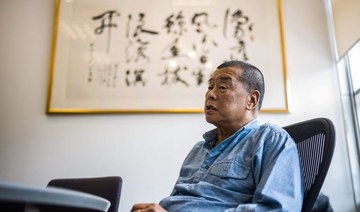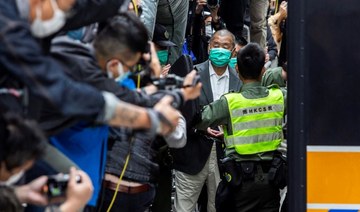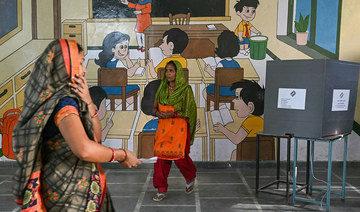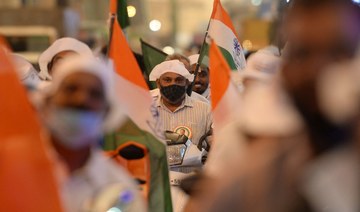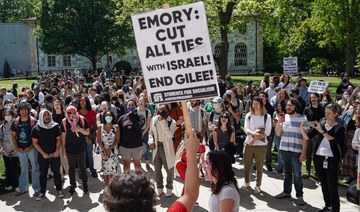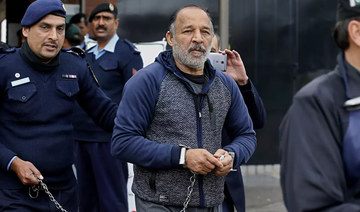HONG KONG: Jailed Hong Kong media tycoon Jimmy Lai was among eight democracy activists handed new prison sentences on Friday for attending protests on the 70th anniversary of the founding of communist China that were followed by a sweeping crackdown.
Lai, who is already behind bars for taking part in earlier protests, must now serve a total of 20 months after pleading guilty to organizing an unlawful assembly on October 1, 2019.
Seven other leading activists, including 25-year-old youth campaigner Figo Chan, as well as former lawmakers Lee Cheuk-yan and Leung Kwok-hung, were also given new jail sentences.
Many flashed “victory” hand signals on their way to court in a police van.
The new sentences are the latest in a relentless and successful campaign by China to smother dissent and dismantle Hong Kong’s democracy movement.
Hong Kong was convulsed by months of huge and often violent pro-democracy protests in 2019 in the most serious challenge to Beijing’s rule since the city’s 1997 handover.
The clashes with police on China’s October 1 National Day were some of the worst of that period.
It was a vivid and embarrassing illustration of how huge swathes of Hong Kong’s population seethe under Beijing’s rule as the government celebrated 70 years since communist China’s founding.
While President Xi Jinping oversaw a huge military parade in Beijing, clashes between hardcore protests and police raged across Hong Kong that day.
The march attended by the activists who were jailed on Friday remained largely peaceful. But it did not have official police permission, a requirement in Hong Kong.
“It was naive to believe a rallying call for peaceful and rational behavior would be enough to ensure no violence,” district judge Amanda Woodcock said as she handed down jail sentences to the eight activists.
China has responded to the democracy rallies with a broad clampdown on Hong Kong, including the imposition of a sweeping national security law that outlaws much dissent.
Hong Kong authorities on Thursday banned the annual June 4 vigil marking Beijing’s 1989 Tiananmen Square crackdown, with security minister John Lee warning the security law could be used against those who defy the ban.
More than 10,000 people were arrested during Hong Kong’s democracy protests, with around 2,500 convicted for various offenses.
Most of the city’s prominent democracy leaders are either under arrest, in jail or have fled overseas.
More than 100 people, including Lai, have been charged under the security law, which carries up to life in jail.
Those handed jail terms on Friday are from the more moderate wing of Hong Kong’s democracy movement. Four were already serving jail sentences for taking part in protests.
Many of them have spent decades advocating non-violence in their ultimately fruitless campaign for universal suffrage.
Figo Chan, for example, was a key figure in the Civil Human Rights Front, the coalition that organized some of the largest rallies of 2019 when hundreds of thousands turned up.
Supporters chanted “Add oil!” — a Chinese phrase of encouragement — as the group were led into court on Friday.
At a mitigation hearing earlier in the week, Chan accused Hong Kong’s unelected leaders of failing to give citizens an avenue to voice their dissatisfaction.
“If the government listened to people’s demands, then it would not be necessary for the people to use violence to get the government to respond,” he told the court.
Lee Cheuk-yan, 63, said he had no regrets about the prospect of going to jail.
“For over 40 years I have strived for democratic reform in China,” he told the court.
“This is my unrequited love, the love for my country with such a heavy heart.”
China says the clampdown and security law is needed to return stability.
It has dismissed the democracy demands and says the protests were instigated by “foreign forces” who want to undermine China.
Many Western nations say Beijing has shredded its promise that Hong Kong could maintain certain freedoms and autonomy under a “One Country, Two Systems” arrangement agreed before the city’s 1997 handover.
Jimmy Lai among eight more Hong Kong democracy activists jailed
https://arab.news/8fu63
Jimmy Lai among eight more Hong Kong democracy activists jailed
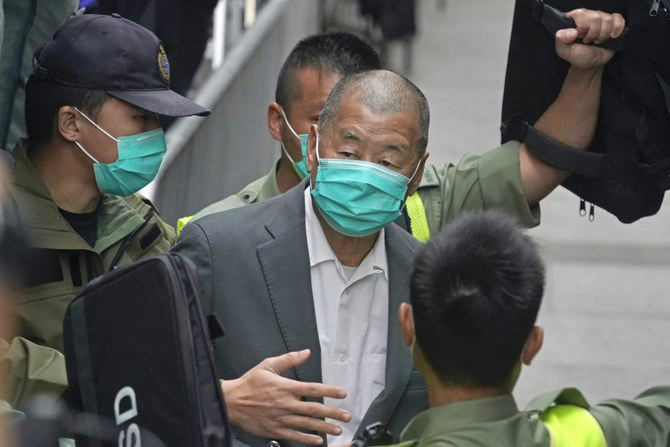
- Media tycoon is already behind bars for taking part in earlier protests
- More than 10,000 people were arrested during Hong Kong’s democracy protests
India’s mammoth election heats up in trend-defining second phase
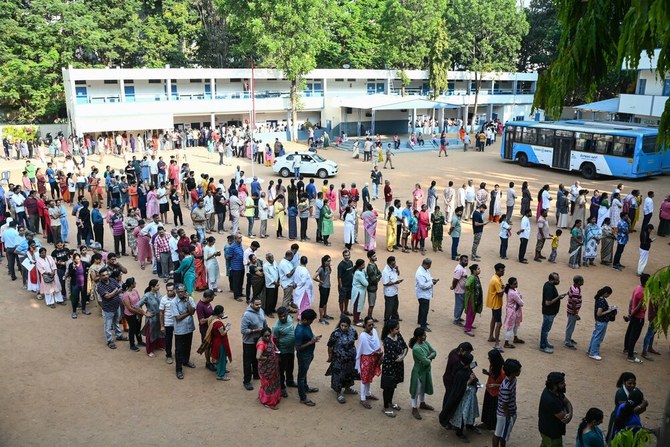
- Second phase is seen by analysts as defining dynamics of rest of the polls
- Turnout in first phase was lower than expected — 66 percent, compared with 70 percent in 2019
NEW DELHI: India’s mammoth general election rolled on Friday into its second phase, which is widely believed to likely set the trend for the rest of the polls.
More than 968 million voters were registered to cast the ballot vote in the world’s most populous country, where incumbent Prime Minister Narendra Modi and his Hindu nationalist Bharatiya Janata Party are eyeing a rare third straight five-year term in power.
The first phase of the vote was on April 19 as polling takes place over six weeks, with results expected on June 4. The other voting dates will be May 7, May 13, May 20, May 25 and June 1.
India has a total of 28 states and eight federally governed territories. Some regions complete the process on a single day, and others spread it out over several phases.
Voting last week took place in 21 states and union territories, with nearly 169 million people eligible to cast their ballots. In the second phase, more than 160 million people were expected to vote across 13 states and federal territories.
As many as 1,202 candidates contested the polls on Friday, vying for 88 of the 543 seats in the lower house of Parliament. In the previous phase, 102 seats were up for grabs.
More than half of the 88 seats were in the southern states of Kerala and Karnataka and the northwestern state of Rajasthan.
The party or coalition that wins at least 272 seats will form the government.
Modi, who ahead of the election was targeting 400 seats for his BJP-led National Democratic Alliance, is challenged by an alliance of two dozen opposition parties — the Indian National Developmental Inclusive Alliance, or INDIA, led by the Congress party, which has ruled the country for close to 45 years since independence in 1947.
‘MINI-GENERAL ELECTION’
The second phase of India’s polls is seen by analysts as defining the dynamics of the remaining five phases. One of the factors was the voter turnout, which in this election might be lower.
In the first phase, 66 percent of those eligible to vote cast their ballot — compared with 70 percent in 2019.
“From the first phase of the election, the message went that there is a silent undercurrent against the BJP and the dip in the voting percentage sent the signal that the BJP would slip in its strongholds in northern India particularly Uttar Pradesh,” Umakant Lakhera, political commentator in Delhi, told Arab News.
“If the trend of voters’ perceived apathy toward the election in general — and the BJP in particular — continues, then it’s an opportunity for the opposition Congress party to consolidate and mobilize its resources to widen its reach and capitalize on anti BJP sentiment.”
The key leader of the opposition coalition and Congress member is Rahul Gandhi, the son of Rajiv Gandhi, a grandson of Indira Gandhi, and a great-grandson of Jawaharlal Nehru, all of whom served as prime ministers of India.
Gandhi is seeking re-election from Wayanad in Kerala — the only major state that has never elected a BJP member of parliament, and where it was not a main competitor. This year, Modi’s party has been trying to make inroads into the state’s political scene.
The main contenders, besides Gandhi, are Annie Raja of the Communist Party of India and BJP’s K. Surendran.
“Kerala always has witnessed bipolar politics, but the BJP has been trying this time to make it a triangular contest, and this election will test whether a third force can find space in Kerala or not,” Prof. G. Gopa Kumar, political scientist and adviser to the Kerala-based Center for Public Policy Research, told Arab News.
“The second phase will test whether the stigma of the BJP of being an outsider in Kerala will continue or not, whether the stigma of not winning a seat in Kerala will continue or not.”
Far from Kerala, in the north, where several states were also going to the polls, another test was taking place at the same time — for the Congress party. Congress plunged to a historic low when it was swept out of power by the BJP in the 2014 general vote, and won its second-lowest number of 52 seats in 2019.
“The second phase is a mini-general election. What is at stake is whether the Congress is going to challenge the dominance of the BJP in the north Indian states like Uttar Pradesh, Rajasthan, Madhya Pradesh or not,” Kumar said.
“The contest is getting serious from now on. For the Congress, it is a survival question as they have to prove that they can defeat the BJP and survive as a big force.”
Although surveys suggest Modi will easily win a comfortable majority in parliament, his 400-seat target, often repeated ahead of the polls, has not been cited since last week’s first phase.
Asad Rizvi, an analyst based in Lucknow, the capital of India’s most populous state and BJP stronghold, Uttar Pradesh, said that the performance was apparently not as good as expected, despite the repetition of the party’s tactics of polarization along religious lines.
“A perception has come to dominate after the first phase of elections that the BJP has not performed well in its strongholds in Uttar Pradesh, therefore, the BJP will have a tough time mobilizing its core voters to retain the seats,” he told Arab News.
“The second phase is also crucial that will test whether the BJP’s communal agenda is working or not.”
Ukraine’s Zelensky calls for air defense systems as allies meet
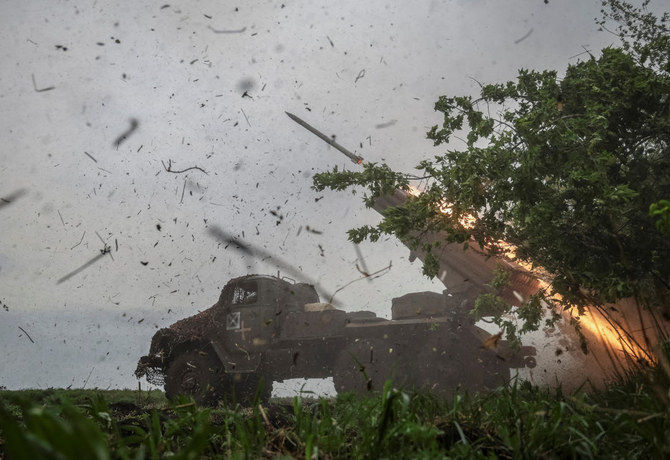
- “We need the ability to shoot down the air combat aircraft so that they do not approach our positions and borders,” Zelensky said
- US Defense Secretary Lloyd Austin said the meeting would focus on Ukraine’s air defense capabilities
WASHINGTON: Ukrainian President Volodymyr Zelensky on Friday called for additional air defense systems to be sent to Kyiv to help protect against Russian strikes, adding that a pause in US funding had helped Moscow seize the initiative.
“This year, Russian jets (have) already used more than 9,000 guided aerial bombs against Ukraine and we need the ability to shoot down the air combat aircraft so that they do not approach our positions and borders,” Zelensky said at the start of a virtual meeting led by the United States on helping arm Ukraine.
US Defense Secretary Lloyd Austin said the meeting would focus on Ukraine’s air defense capabilities.
The meeting comes days after Congress emerged from a half-year of deadlock to approve a $61 billion aid package for Ukraine. President Joe Biden’s administration quickly announced $1 billion in artillery, air defenses and other hardware would soon be heading to Ukrainian front lines.
“While we were waiting for a decision on the American support, the Russian army managed to seize the initiative on the battlefield,” Zelensky said.
“We can still now, not only stabilize the front, but also move forward achieving our Ukrainian goals in the war,” he added.
The United States hopes its new deliveries of weaponry will help Ukraine rebuild defenses and refit its forces as it recovers from a gap in US assistance, but it does not expect Kyiv to launch large-scale offensive operations against Russian forces in the near term.
The influx of weapons could improve Kyiv’s chances of averting a major Russian breakthrough in the east, just over two years since the start of Moscow’s full-scale invasion, military analysts say.
But it remains unclear how much pressure Kyiv can apply on Russia after months of rationing artillery as its stocks ran low. Kyiv also faces manpower shortages on the battlefield and questions linger over the strength of its fortifications along a sprawling, 1,000-km (621-mile) front line.
India’s mammoth election heats up in trend-defining second phase
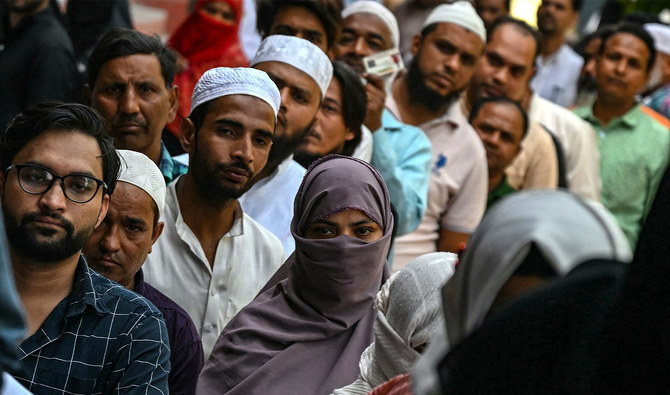
- Turnout in first phase lower than expected at 66 percent compared with 70 percent in 2019
- PM Modi and his BJP are eyeing a rare third straight five-year term in power
NEW DELHI: India’s mammoth general election rolled on Friday into its second phase, which analysts widely believe will likely set the trend for the rest of the polls.
More than 968 million voters are registered to cast the ballot vote in the world’s most populous country, where incumbent Prime Minister Narendra Modi and his Hindu nationalist Bharatiya Janata Party are eyeing a rare third straight five-year term in power.
Modi, who ahead of the election was targeting 400 seats for his BJP-led National Democratic Alliance led by his BJP, is challenged by an alliance of two dozen opposition parties: the Indian National Developmental Inclusive Alliance, or INDIA, led by the Congress Party, which has ruled the country for close to 45 years since independence in 1947.
The first phase of the vote took place on April 19. Polling will go on for six weeks, with results expected on June 4. The other voting dates will be May 7, May 13, May 20, May 25 and June 1.
Analysts say the second phase of India’s polls will define the dynamics of the remaining five phases.
In the first phase, 66 percent of those eligible to vote cast their ballot, compared with 70 percent in 2019.
“From the first phase of the election, the message went that there is a silent undercurrent against the BJP and the dip in the voting percentage sent the signal that the BJP would slip in its strongholds in northern India particularly Uttar Pradesh,” Umakant Lakhera, political commentator in Delhi, told Arab News.
“If the trend of voters’ perceived apathy toward the election in general, and the BJP in particular, continues, then it’s an opportunity for the opposition Congress party to consolidate and mobilize its resources to widen its reach and capitalize on anti BJP sentiment.”
India has a total of 28 states and eight federally governed territories. Some regions complete the voting process in a single day, and others have it spread out in several phases.
Voting last week took place in 21 states and union territories, with nearly 169 million people eligible to cast their ballots. In the second phase, more than 160 million people are expected to vote across 13 states and federal territories.
As many as 1,202 candidates contested the polls on Friday, vying for 88 of the 543 seats in the lower house of Parliament. In the previous phase, 102 seats were up for grabs.
More than half of the 88 seats were in the southern states of Kerala and Karnataka and the northwestern state of Rajasthan.
The party or coalition that wins at least 272 will form the government.
‘MINI GENERAL ELECTION’
The key leader of the opposition coalition and a Congress member is Rahul Gandhi, the son of Rajiv Gandhi, a grandson of Indira Gandhi, and a great-grandson of Jawaharlal Nehru, all of whom have served as prime ministers of India.
But the Congress plunged to a historic low when it was swept out of power by the BJP in the 2014 general vote, and won its second-lowest number of 52 seats in 2019.
Gandhi is seeking re-election from Wayanad in Kerala, the only major state that has never elected a BJP member of parliament, and where Modi’s party was not a main competitor but has been trying to make inroads since last year.
The main contenders, besides Gandhi, are Annie Raja of the Communist Party of India and BJP’s K. Surendran.
“Kerala always has witnessed bipolar politics, but the BJP has been trying this time to make it a triangular contest, and this election will test whether a third force can find space in Kerala or not,” Prof. G. Gopa Kumar, political scientist and adviser to the Kerala-based Center for Public Policy Research, told Arab News.
“The second phase will test whether the stigma of the BJP of being an outsider in Kerala will continue or not, whether the stigma of not winning a seat in Kerala will continue or not.”
Another test for the Congress will be far from Kerala, in the north, where several states were also going to the polls.
“The second phase is a mini-general election. What is at stake is whether the Congress is going to challenge the dominance of the BJP in the north Indian states like Uttar Pradesh, Rajasthan, Madhya Pradesh or not,” Kumar said.
“The contest is getting serious from now on. For the Congress, it is a survival question as they have to prove that they can defeat the BJP and survive as a big force.”
Although surveys suggest Modi will easily win a comfortable majority in parliament, his 400-seat target often repeated ahead of the polls has not been cited since last week’s first phase.
Asad Rizvi, an analyst based in Lucknow, the capital of India’s most populous state and BJP stronghold, Uttar Pradesh, said the party’s performance was not as good as expected despite its tactic to polarize along religious lines.
“A perception has come to dominate after the first phase of elections that the BJP has not performed well in its strongholds in Uttar Pradesh, therefore, the BJP will have a tough time mobilizing its core voters to retain the seats,” he told Arab News.
“The second phase is also crucial that will test whether the BJP’s communal agenda is working or not.”
Blinken says Gaza protests a hallmark of democracy, decries ‘silence’ on Hamas
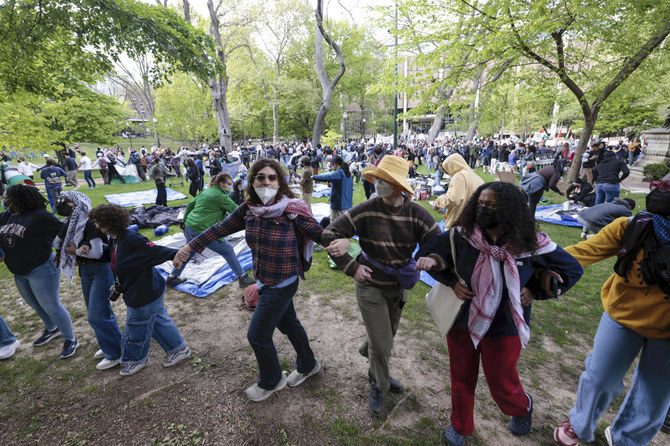
- Police have clashed with students critical of the war and the Biden administration’s support for Israel’s war in Gaza
- Blinken said he understood the conflict elicited “strong, passionate feelings” and that the administration was doing it all it could to halt the war
BEIJING: US Secretary of State Antony Blinken said on Friday protests at US universities over US-ally Israel’s war in Gaza are a hallmark of American democracy, but criticized what he called the “silence” about Palestinian militant group Hamas.
Police have clashed with students critical of the war and the Biden administration’s support for Israel’s war in Gaza, with nearly 550 arrests made over the protests in the last week across major US universities, according to a Reuters tally.
Asked at a press conference in China whether he was taking on board the protesters’ message, Blinken said he understood the conflict elicited “strong, passionate feelings” and that the administration was doing it all it could to halt the war.
“In our own country, it’s a hallmark of our democracy that our citizens make known their views, their concerns, their anger, at any given time, and I think that reflects the strength of the country, the strength of democracy,” Blinken said.
But he suggested critics should focus their ire on Hamas militants who sparked the war with their Oct. 7 attack on southern Israel in which about 1,200 people were killed and some 250 taken hostage, according to Israeli tallies.
Israel’s military response has killed more than 34,000 Palestinians and injured more than 77,000, according to the health ministry in Hamas-ruled Gaza.
“It is also notable that there is silence about Hamas, as if it wasn’t even part of the story,” Blinken said.
“But as I’ve also said repeatedly, the way Israel goes about ensuring that Oct. 7 never happens again matters profoundly. And we’re working every day to try to minimize the damage that’s done to innocent people and to make sure that they have the assistance and support that they need.”
Blinken, who met Chinese President Xi Jinping and other officials in Beijing on Friday, said he had discussed how China can play a constructive role in global crises, including in the Middle East, where he said Beijing can discourage Iran and its proxies not to escalate the conflict.
Blinken said he spoke to Foreign Minister Wang Yi multiple times this month when tensions spiked between Israel and Tehran. China is the main buyer of oil exported by sanctions-hit Iran.
“I think the relationships, again, that China has can be positive in trying to calm tensions, prevent escalation, avoid the spread of the conflict, and we agreed that we’d remain in regular in regular touch on this, and that’s certainly my intention,” Blinken said.
UK man charged with ‘Russia-backed arson plot’ on Ukraine-linked targets
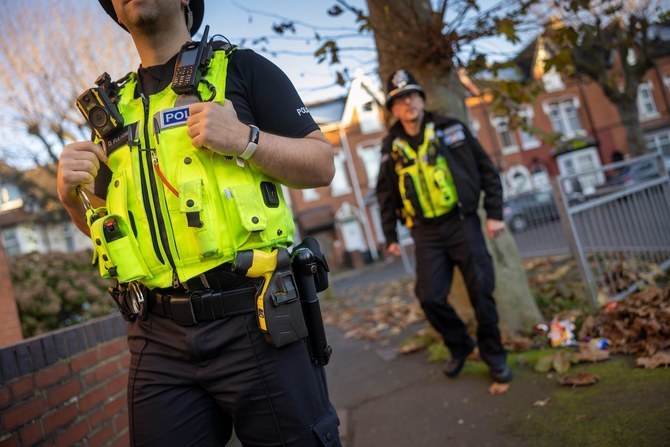
- Court documents allege that suspect Dylan Earl was connected to the proscribed terrorist group the Wagner Group
- He is accused of organizing and paying for an arson attack on two units on an industrial estate in Leyton
LONDON: A 20-year-old British man has been charged with masterminding an arson plot against a Ukrainian-linked target in London for the benefit of the Russian state, prosecutors said on Friday.
“Included in the alleged activity was involvement in the planning of an arson attack on a Ukrainian-linked commercial property in March 2024,” the Crown Prosecution Service said in a statement.
Court documents allege that suspect Dylan Earl, from Leicestershire in central England, was connected to the proscribed terrorist group the Wagner Group, the domestic Press Association news agency reported.
He is accused of organizing and paying for an arson attack on two units on an industrial estate in Leyton, east London, on March 20, which required 60 firefighters to bring under control.
The alleged target is referred to as “Mr X” in the charges.
The CPS, which brings prosecutions in England and Wales, said two other men — Paul English, 60, and Nii Mensah, 21 — had also been charged with aggravated arson in connection with the case.
A third, Jake Reeves, 22, had been charged with agreeing to accept a material benefit from a foreign intelligence service as well as aggravated arson.
A fifth man, Dmitrijus Paulauska, 22, has been charged with having information about terrorist acts, the CPS added.
UK Foreign Secretary David Cameron said: “While we must let the judicial process run its course, I am deeply concerned by allegations of British nationals carrying out criminal activity on UK soil to benefit the Russian state.
“We will use the full weight of the criminal justice system to hold anyone found guilty of crimes linked to foreign interference to account,” he wrote on the social media platform X.
Dominic Murphy, head of the Metropolitan Police in London’s Counter Terrorism Command which is leading the investigation, said: “This is a highly significant moment and investigation for us.
“Not only are the charges that have been authorized by the CPS extremely serious, but it is also the first time that we have arrested, and now charged anyone using the powers and legislation brought in under the National Security Act.”
The National Security Act 2023 came into effect in December last year, and was designed to respond to “the threat of hostile activity from states targeting the UK’s democracy, economy, and values,” the government said at the time.
All five suspects are due to appear at the Central Criminal Court at the Old Bailey, London, on May 10.



